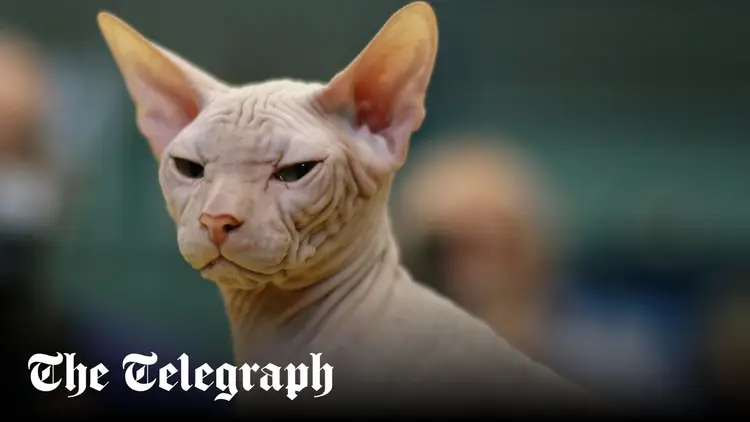Don't buy mutant XL bully cats, animal experts warn

The cat equivalent of a prohibited dog breed in the U.S. faces significant health risks.
Cat owners are being advised not to purchase the feline equivalent of XL bully dogs that have made their way from the US to the UK.
In the United States, breeders have developed what are known as “bully cats.” These felines have physical traits similar to large dogs, thanks to the blending of the gene that leads to hairlessness in Sphynx cats and the gene that produces the short legs characteristic of Munchkin cats.
In a recent research study, animal specialists have cautioned that the bully cat munchkin-sphynx mutant breed may face significant health issues that could shorten their lifespan, potentially causing them to die at least six years earlier than the typical cat.
They are encouraging pet owners to resist the urge to purchase the new mixed breed, as doing so could contribute to the trade and lead to unnecessary pain for the cats involved.
Dr. Grace Carroll, an expert in animal behavior and welfare at Queen’s University Belfast’s School of Psychology, emphasizes that future pet owners should understand the potential dangers linked to owning mutant and experimental breeds.
Buyers have the ability to influence the market. By choosing not to purchase breeds that emphasize looks over the health and well-being of the animals, we can motivate breeders to change their focus.
A trend towards responsible breeding could lead to healthier and happier cats that can fully engage in their natural behaviors, such as climbing, jumping, and relaxing in the sun. It's important to allow cats to be themselves.
XL bully cats are gaining popularity on social media, with at least one breeder focusing on selling them. Bella Jones, who operates the breeding company BullyCats UK, asserts that her cats undergo health checks and are fully capable.
Experts in animal care warn that XL bully cats face a greater chance of developing various health problems due to their baldness.
Dr. Carroll explained, “Kittens naturally struggle to control their body temperature, and being hairless makes this even harder, putting them at greater risk for respiratory illnesses. Additionally, the absence of fur can cause issues like sunburn and increase the likelihood of skin cancer in hairless cats.”
Similar to the sphynx breed, XL bully cats do not have whiskers. This absence can create challenges in how they communicate, move around, and perceive their surroundings.
At the same time, their short legs are associated with various health issues. According to the Cats Protection charity, "Their short legs are a genetic flaw that can result in painful arthritis and lead to difficulties with movement."
Dr. Carroll mentioned that Sphynx cats typically live for around 6.7 years, which is just slightly more than half the typical lifespan of an average cat, which is about 12 years. He added that XL bully cats may have even shorter lifespans.
"Bully cats, with their lack of fur and short legs, might experience double the difficulties compared to sphynx and munchkin breeds," she said.
The NatureWatch Foundation, an organization focused on animal welfare and the fight against illegal animal trade, expressed its worries about the concerning rise in popularity of "bully cats" on social media in recent months. This includes platforms like Facebook, Instagram, and TikTok.
“It’s alarming to witness the rise of these unfortunate cats in the UK. In recent times, we've observed increasingly harsh breeding methods in the dog industry, and it seems that some unethical individuals are now focusing on exploiting cats in a similar fashion, driven by greed and the desire for social media fame. The situation with bully cats is a looming animal welfare crisis, and such breeding practices are nothing short of harsh,” remarked a spokesperson.
Dr. Dan O’Neill, an Associate Professor specializing in Companion Animal Epidemiology at the Royal Veterinary College, expressed his deep concern, stating, “It’s truly sad to witness cats experiencing the same kind of pain that has been brought about by the emergence of the bully cat.”
Bully cats tend to have shorter lifespans for similar reasons. Breeding for certain genetic mutations—like hairlessness, which can cause sunburn; dwarfism, leading to movement problems and joint pain; and extra skin folds that can result in chronic skin infections—means that many bully cats will face a lot of suffering throughout their lives.
If you're considering getting a cat or a dog, the most important thing to keep in mind is the well-being of the animal. Take a moment to reflect before choosing a pet with an unusual and exaggerated body shape that isn't commonly found in the wild.













































